Matthew Kukah, Bishop of Sokoto Diocese has lambasted President Muhammadu Buhari amid tears and weeping as the Catholic Church in Kaduna State buried slain seminarian Michael Nnadi on Tuesday.
TheNewsGuru.com (TNG) reports Bishop Kukah said, in his lengthy homily at the funeral mass for the slain seminarian, which held at Good Shepherd Seminary in Kaduna that “Nigeria is at a point where we must call for a verdict” and that “Nigeria needs to pause for a moment and think”.
“No one could have imagined that in winning the Presidency, General Buhari would bring nepotism and clannishness into the military and the ancillary Security Agencies, that his government would be marked by supremacist and divisive policies that would push our country to the brink.
“This President has displayed the greatest degree of insensitivity in managing our country’s rich diversity. He has subordinated the larger interests of the country to the hegemonic interests of his co-religionists and clansmen and women.
“The impression created now is that, to hold a key and strategic position in Nigeria today, it is more important to be a northern Muslim than a Nigerian,” Bishop Kukah stated.
Read Bishop Kukah’s homily at the funeral mass of slain Michael Nnadi below:
Homily by Matthew Hassan Kukah, Bishop of Sokoto Diocese at the Funeral Mass of Seminarian Michael Nnadi (Sokoto Diocese), on 11th February 2020 at Good Shepherd Seminary, Kaduna
We have gathered around the remains of Michael in supplication but also as solemn witnesses to the penetrating darkness that hovers over our country. I have the rare honour of being considered the principal mourner in this ugly tragedy. It is not an honour that I am worthy of receiving. The honour belongs to God Almighty who created Michael and marked out this moment and pathway for him.
The greater honour goes to his immediate family whose devotion as Catholics laid the foundation for his faith and vocation. To his grandmother, Mrs. Eunice Nwokocha, a most simple, beautiful and devout Catholic woman whose devotion and dedication saw Michael and his siblings, Chukwuebuka, Francis, Augustine and Raphael brought up in all the fine principles and disciplines of the Catholic faith.
The way that Mama and her grandchildren handled this family tragedy has shown clearly the depth of their faith. I got to know Mama only after the sudden death of her daughter, Caroline, who had been a devoted Lector in our Cathedral. On the day we learnt that Michael and the other Seminarians were kidnapped, breaking the news to Mama and the children was not an easy task. She took the news with equanimity and we focused on praying for their release. She and the grandchildren lived through the torments of the brutal, harsh and senseless haranguing of the kidnappers who are totally empty of any show of human emotions.
When the worst finally happened, breaking the news to her and the grandchildren proved to be one of the most emotionally challenging moments for me. She had called me three days earlier to say that the kidnappers had told her that they had killed Michael. I dismissed it by telling her that first, I had discouraged her from taking their calls, and secondly that this was part of the psychological warfare by these evil men.
On Wednesday 29th, Peter Paul, the brave young man who had served as the main negotiator with the kidnappers, had already told us that they had gone to the village where the kidnappers said they had dumped the bodies of both Michael and Mrs. Ataga but found no corpses. This was the thread of consolation we held on to as a means of solace that Michael was still alive.
When we concluded the negotiations with the kidnappers on Thursday evening, I was in the Seminary to receive the three Seminarians and, although we received only two, I was still confident that Michael was still alive. We were simply going to sit and wait out for the next call and the agonizing round of negotiations again. I left for Abuja that same evening to continue my trip to Sokoto the next day. It was on my way to the airport to catch a flight back to Sokoto on that Saturday morning that Fr Daboh called to tell me that the corpse of Mrs. Ataga had been found and that there was a second unidentified corpse which they were being asked to come and identify if it was Michael. My heart sank.
After the call, I switched off my phone in denial, but hoping for some reprieve to enable me board my flight with some sanity. I arrived Sokoto and refused to switch on my phone for some time. When I finally did, I refused to read the text messages, but then, Fr Habila’s call came through at about 1pm with the news that, sadly, they had identified the corpse as that of Michael. I did not know where to start and how to break the news to Mama.
Happily, two of our senior Parishioners, Sir Julius Dike and Mathews Otalike, were on hand and I summoned them to my house. It took us the better part of seven hours to negotiate how to break the news because, first, Mama was in the market and I felt she should at least finish the day’s business in peace.
Finally breaking the news opened a different chapter in this ugly, painful but memorable tragedy. Like the death of Lazarus, it would become clear to me that Michael’s death would bring glory to God.
Later that evening as I sat down to try and console Mama, she looked up at me and said tearfully, “My Lord, you said Michael was still alive. Is he really dead?” Before I could say anything, she provided a moving answer: “My Lord, but Michael entered Seminary with all his heart and body, all”, she said with finality.
From that evening, I watched her regain her composure and right up to Saturday, the evening before I left Sokoto, she had become a consoler and an inspiration to others.
The depth and impact of this tragedy belongs first, to the three surviving colleagues of Michael, the entire Seminary community led by the Rector, Fr. Habila Daboh, his team of formators and entire family of Good Shepherd Seminary. All have lived through almost two months of trauma, agony, pain and despair. They have been held together by the glue of deep faith, hope and family solidarity. I commend all the Formators for standing together and guiding the Seminarians through this dark tunnel of emotional pain in the days that turned to weeks, and weeks that turned to months.
The entire Catholic community in the Province, led by our Metropolitan, Archbishop Matthew Ndagoso, all shared in this burden. His Grace and the Rector will both speak to us at the end of the Mass.
The third layer of pain has been borne by the entire country and the Catholic world. The national and international reactions to the death of this young man have made me step back and ask what message God has for our country.
Michael is the first Seminarian to carry the mark of this brutality and wickedness. Priests have died in the hands of these wicked human beings. Michael was only a Seminarian in his first year of training. I had seen him in his cassock which he wore in my presence, not with pride but with dignity. Why would the tragic death of a young man such as him elicit such an unprecedented level of emotions here and around the world?
Maria Lozano, a staff of the Aid to the Church In Need, an organisation dedicated to the cause of the persecution of Christians around the world, called me frantically immediately after the news of the kidnapping of the Seminarians went out.
The next day, she sent me an emotional voice message to say that she heard that Michael was an orphan and that since the kidnappers will be looking for money might his life be in danger if they realise that he is an orphan? Could she mobilise especially mothers to become parents for him, to keep him and others in their hearts and to continue to pray for him? Maria remained with us emotionally and requested for information about the burial.
When the Archbishop approved the date of the burial, I passed the information to her immediately. By the next day, February 5th, she sent me a message to say that when she asked people around the world to light a candle for Michael on the date of his burial, 2, 436 persons from Afghanistan, Pakistan, United States of America, Mexico, Venezuela, Colombia, Madagascar, South Africa, Congo, Mali, Spain, Turkey, Saudi Arabia responded.
Germany alone had a total of 3,305 persons in a matter of hours. In the light of this, I wondered, who are we to mourn? Who are we to refuse this crown of honour and glory? We ceased to mourn for Michael thereon.
Your Grace, my brother Bishops, Rev Fathers, Rev. Sisters, and all the good people of God, I therefore bring you only greetings and praise to God from all of us in Sokoto Diocese.
This is a solemn moment for the body of Christ. This is for us the moment of decision. This is the moment that separates darkness from light, good from evil. Our nation is like a ship stranded on the high seas, rudderless and with broken navigational aids.
Today, our years of hypocrisy, duplicity, fabricated integrity, false piety, empty morality, fraud and Pharisaism have caught up with us. Nigeria is on the crossroads and its future hangs precariously in a balance. This is a wakeup call for us. As St. Paul reminds us; The night is far spent, and the day is at hand. Therefore, let us cast away the works of darkness and put on the armour of light (Rom. 13:12). It is time to confront and dispel the clouds of evil that hover over us.
Nigeria is at a point where we must call for a verdict. There must be something that a man, nay, a nation should be ready to die for. Sadly, or even tragically, today, Nigeria, does not possess that set of goals or values for which any sane citizen is prepared to die for her.
Perhaps, I should correct myself and say that the average office holder is ready to die to protect his office but not for the nation that has given him or her that office.
The Yorubas say that if it takes you 25 years to practice madness, how much time would you have to put it into real life? We have practiced madness for too long. Our attempt to build a nation has become like the agony of Sisyphus who angered the gods and had to endure the frustration of rolling a stone up the mountain. Each time he got near the top, the gods would tip the stone back and he would go back to start all over again. What has befallen our nation?
Nigeria needs to pause for a moment and think. No one more than the President of Nigeria, Major General Muhammadu Buhari who was voted for in 2015 on the grounds of his own promises to rout Boko Haram and place the country on an even keel.
In an address at the prestigious Policy Think Tank, Chatham House in London, just before the elections, Major General Buhari told his audience: “I as a retired General and a former Head of State have always known about our soldiers. They are capable and they are well trained, patriotic, brave and always ready to do their duty. If am elected President, the world will have no reason to worry about Nigeria. Nigeria will return to its stabilizing role in West Africa. We will pay sufficient attention to the welfare of our soldiers in and out of service. We will develop adequate and modern arms and ammunition. We will improve intelligence gathering and border patrols to choke Boko Haram’s financial and equipment channels. We will be tough on terrorism and tough on its root causes by initiating a comprehensive economic development and promoting infrastructural development…we will always act on time and not allow problems to irresponsibly fester. And I, Muhammadu Buhari, will always lead from the front.”
There is no need to make any further comments on this claim. No one in that hall or anywhere in Nigeria doubted the President who ran his campaign on a tank supposedly full of the fuel of integrity and moral probity.
No one could have imagined that in winning the Presidency, General Buhari would bring nepotism and clannishness into the military and the ancillary Security Agencies, that his government would be marked by supremacist and divisive policies that would push our country to the brink. This President has displayed the greatest degree of insensitivity in managing our country’s rich diversity.
He has subordinated the larger interests of the country to the hegemonic interests of his co-religionists and clansmen and women. The impression created now is that, to hold a key and strategic position in Nigeria today, it is more important to be a northern Muslim than a Nigerian.
Today, in Nigeria, the noble religion of Islam has convulsed. It has become associated with some of worst fears among our people. Muslim scholars, traditional rulers and intellectuals have continued to cry out helplessly, asking for their religion and region to be freed from this chokehold. This is because, in all of this, neither Islam nor the north can identify any real benefits from these years that have been consumed by the locusts that this government has unleashed on our country.
The Fulani, his innocent kinsmen, have become the subject of opprobrium, ridicule, defamation, calumny and obloquy. His north has become one large grave yard, a valley of dry bones, the nastiest and the most brutish part of our dear country.
Why have the gods rejected this offering? Despite running the most nepotistic and narcissistic government in known history, there are no answers to the millions of young children on the streets in northern Nigeria, the north still has the worst indices of poverty, insecurity, stunting, squalor and destitution.
His Eminence, the Sultan of Sokoto, and the Emir of Kano are the two most powerful traditional and moral leaders in Islam today. None of them is happy and they have said so loud and clear. The Sultan recently lamented the tragic consequences of power being in the wrong hands.
Every day, Muslim clerics are posting tales of lamentation about their fate. Now, the Northern Elders, who in 2015 believed that General Buhari had come to redeem the north have now turned against the President.
We are being told that this situation has nothing to do with Religion. Really? It is what happens when politicians use religion to extend the frontiers of their ambition and power. Are we to believe that simply because Boko Haram kills Muslims too, they wear no religious garb? Are we to deny the evidence before us, of kidnappers separating Muslims from infidels or compelling Christians to convert or die?
If your son steals from me, do you solve the problem by saying he also steals from you? Again, the Sultan got it right: let the northern political elite who have surrendered the space claim it back immediately.
The persecution of Christians in northern Nigeria is as old as the modern Nigerian state. Their experiences and fears of northern, Islamic domination are documented in the Willinks Commission Report way back in 1956. It was also the reason why they formed a political platform called, the Non-Muslim League.
All of us must confess in all honesty that in the years that have passed, the northern Muslim elite has not developed a moral basis for adequate power sharing with their Christian co-regionalists. We deny at our own expense. By denying Christians lands for places of worship across most of the northern states, ignoring the systematic destruction of churches all these years, denying Christians adequate recruitment, representation and promotions in the State civil services, denying their indigenous children scholarships, marrying Christian women or converting Christians while threatening Muslim women and prospective converts with death, they make building a harmonious community impossible.
Nation building cannot happen without adequate representation and a deliberate effort at creating for all members a sense, a feeling, of belonging, and freedom to make their contributions.
This is the window that the killers of Boko Haram have exploited and turned into a door to death. It is why killing Christians and destroying Christianity is seen as one of their key missions.
On our part, I believe that this is a defining moment for Christians and Christianity in Nigeria. We Christians must be honest enough to accept that we have taken so much for granted and made so much sacrifice in the name of nation building.
We accepted President Buhari when he came with General Idiagbon, two Muslims and two northerners. We accepted Abiola and Kingibe, thinking that we had crossed the path of religion, but we were grossly mistaken. When Jonathan became President, and Senator David Mark remained Senate President while Patricia Ette was chosen by the South West became a Speaker. The Muslim members revolted and forced her resignation with lies and forgery. The same House would shamelessly say that they had no records of her indictment.
Today, we are living with a Senate whose entire leadership is in the hands of Muslims. Christians have continued to support them. For how long shall we continue on this road with different ambitions? Christians must rise up and defend their faith with all the moral weapons they have.
We must become more robust in presenting the values of Christianity especially our message of love and non-violence to a violent society. Among the wolves of the world, we must become more politically alert, wise as the serpent and humble as the dove (Mt. 10:16).
Every Religion has the seeds of its own redemption or destruction. It is a choice between Caesar and God. We cannot borrow the crown of Caesar without consequences. The boundaries between faith and reason are delicate but they are fundamental to how a society builds a moral code.
Faith without reason breeds the fanatic, the demagogue who genuinely but wrongly believes that he has heard the voice of a god ordering him to kill another. Reason without faith produces the ideologues who will also kill because the ideology of the state orders him to do so. Societies can only survive when a Constitutional basis has been established to create a balance between both extremes and to place our common humanity at the centre of every pursuit.
My dear brothers and sisters, Anger, the quest for Vengeance, are a legitimate inheritance of the condition of unredeemed human being. Both have appeal. Through Violence, you can murder the murderer, but you cannot murder Murder. Through violence, you can kill the Liar, but you cannot kill Lies or install truth. Through Violence, you can murder the Terrorist, but you cannot end Terrorism. Through Violence, you can murder the Violent, but you cannot end Violence. Through Violence, you can murder the Hater, but you cannot end Hatred. Unredeemed man sees vengeance as power, strength and the best means to teach the offender a lesson. These are the ways of the flesh.
Christianity parts ways with other Religions when it comes to what to do with the enemy. Here, we must admit, Christianity stands alone. This is the challenge for us as Christians. Others believe in an eye for an eye, a tooth for a tooth, or that one can take either blood money or make some form of reparation one way or the other.
However, for us Christians, Jesus stands right in the middle with a message that is the opposite of all that is sensible to us as human beings. Put back your sword (Mt. 26: 52). Turn the other cheek (Mt. 5:38). Pray for your enemy (Mt. 5: 44). Give the thief your cloak (Lk. 6:29). None of these makes sense to the human mind without faith.
This is why Jesus said the only solution is for us to be born again (Jn. 3:3). The challenge before us is to behold the face of Jesus and ask the question, Are we Born against hatred, anger, violence and vengeance?
There is hope, my dear friends. Are we angry? Yes, we are. Are we sad? Of course, we are. Are we tempted to vengeance? Indeed, we are. Do we feel betrayed? You bet. Do we know what to do? Definitely. Do we know when to do it? Why not? Do we know how? Absolutely. Are we in a war? Yes. But what would Christ have us do? The only way He has pointed out to us is the non-violent way. It is the road less travelled, but it is the only way.
How and why does God choose these young persons as our models? Leah Sharibu and now Michael, all teenagers when they confronted evil and became martyrs.
In a recent report in Daily Trust on February 2, 2020, I read the story of one of the Dapchi girls and their incredible show of bravery in the face of fire. They were asked by their ferocious captors to point out the Christians among them or they would all face death. In response, they said in unison that they were all Muslims. Then, she continued, “when they intensified their threat to kill us, Leah stood up and said that she was a Christian. She said they could go ahead and kill her instead of killing all of us. So, they separated her from us…before we were rescued, they told us that if Leah would convert to Islam, they would free us, so we tried as much as possible to convince her but she refused saying she would never renounce her religion for fear of death.”
We have no evidence of what transpired between Michael and his killers. However, for us Christians, this death is a metaphor for the fate of all Christians in Nigeria but especially northern Nigeria. For us Christians, it would seem safe to say that we are all marked men and women today. Yet, we must be ready to be washed in the blood of the lamb.
The testimony of the Dapchi girl above suggests that our country has a future, a future based on the innocence of our youth who have seen beyond religion.
Leah Sharibu is a martyr for the faith and so is Michael. St Paul has already said it well: We carry this treasure in vessels of clay so that all this surpassing power may not be seen as ours, but as God’s. Trials of every sort come our way, but we are not discouraged.
We are left without answers but we do not despair, persecuted but not abandoned, knocked down but not crushed. At any moment, we carry in our person, the death of Jesus, so that in life, Jesus may also be manifested in us (2 Cor. 4: 7-10).
Finally, we praise and thank God that Pius, Peter and Stephen are alive and will continue to bear earthly testimony of this horror. May God help them to all heal.
We join the family of Michael in their act of forgiveness while calling on God give these killers their own road to Damascus experience deep in the forests and highways.
For now, we in Sokoto are at peace and feel mightily honoured that we have been chosen for this task of being called upon to walk the footsteps of the passion of Jesus Christ.
We know that the Lord’s burden is never heavy. We are humbled but not bowed. Although we are only a little flock, we are pleased to offer from the little we have to the Master.
Like the owner of the donkey on which Jesus rode to Jerusalem, we are asking no question because the Master has asked for Michael (Lk. 19:31). Like the Galileans (Lk. 13:1), we surrender the blood of Michael to the vicious Herods of today but we know we will one day rise to a new life.
The choice of our son Michael as a Simon of Cyrene is a remarkable gift that we must embrace with both hands. We feel as if our son has been chosen to represent us in the national team of martyrs. Without fear, we will complete the journey he started because his memory will give us strength.
We know that Michael’s strength will inspire an army of young people to follow in his steps. We will march on with the cross of Christ entrusted to us, not in agony or pain, because our salvation lies in your cross. We have no vengeance or bitterness in our hearts. We have no drop of sorrow inside us. We are honoured that our son has been summoned to receive the crown of martyrdom at the infancy of his journey to the priesthood. We are grateful that even before he could ascend the earthly altar, Jesus the high priest, called Him to stand by His angels.
He was a priest by desire but he is concelebrating the fullness of the priesthood beside His Master. He was lifted up even before his hands could lift up the sacred chalice.
May the Lord place him beside His bosom and may he intercede for us. If his blood can bring healing to our nation, then his murderers will never have the final say. May God give him eternal peace.

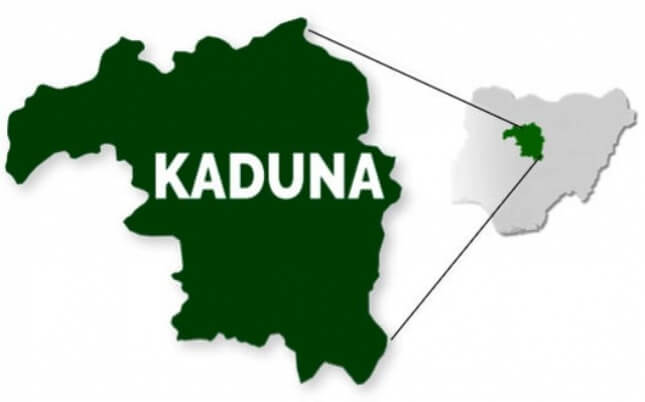
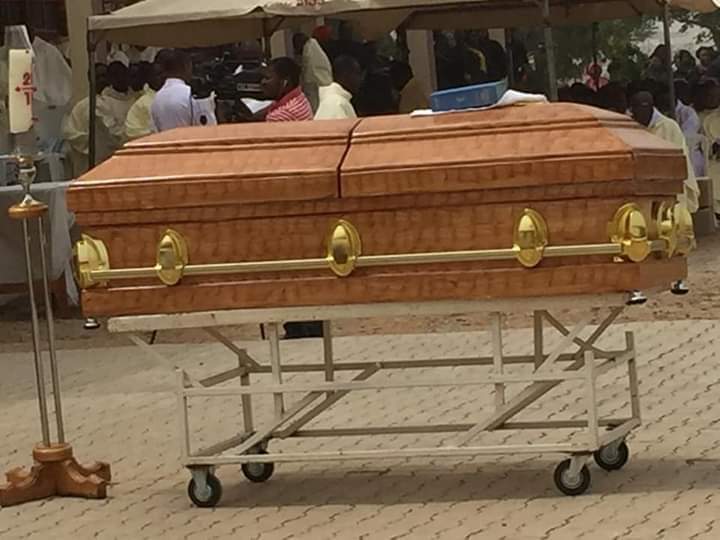
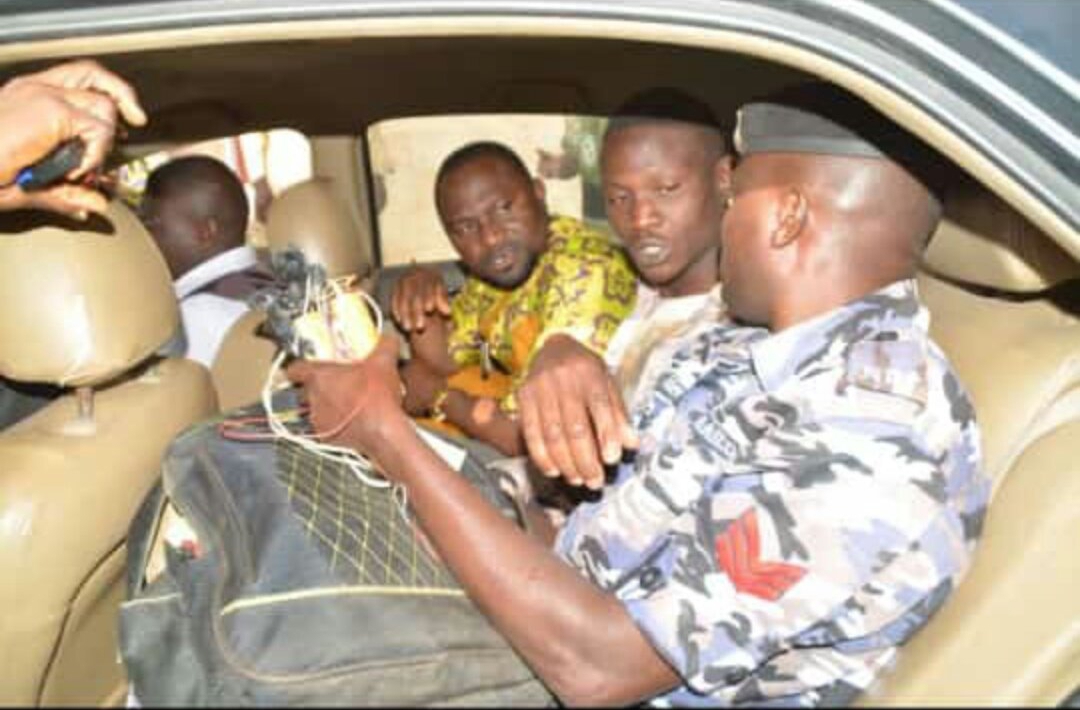
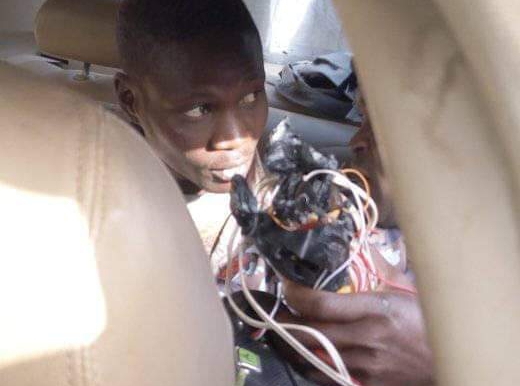
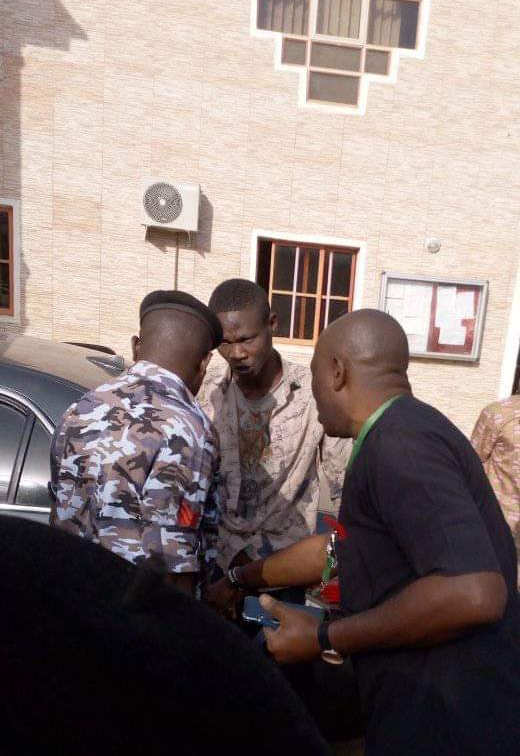

![Breaking: Suicide bomber arrested as Police avert death at Living Faith church [Photos]](http://thenewsguru.ng/wp-content/uploads/2020/02/IMG_20200202_153657_1580654274219.jpg)